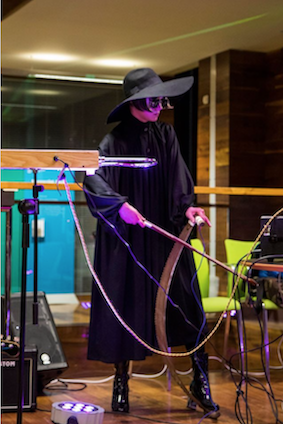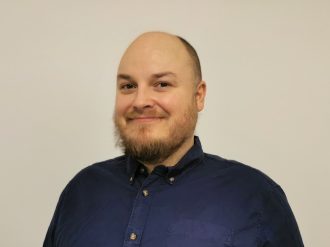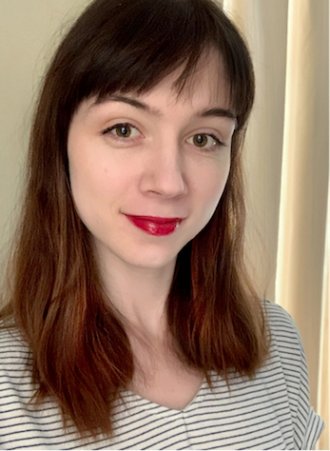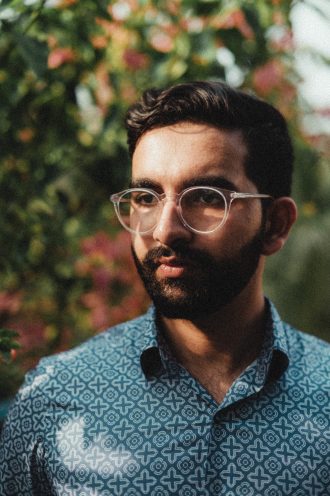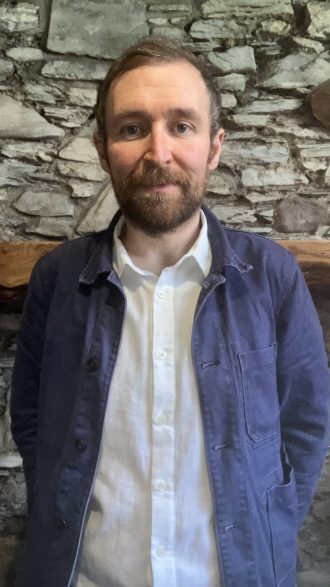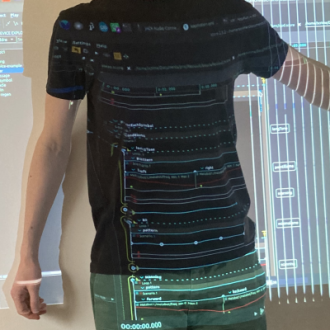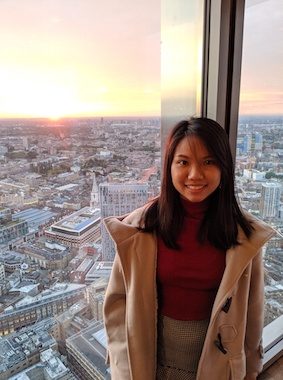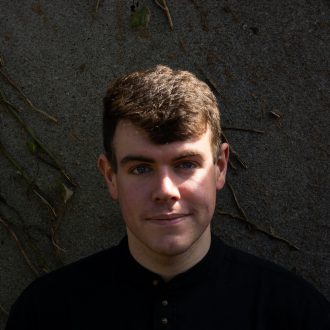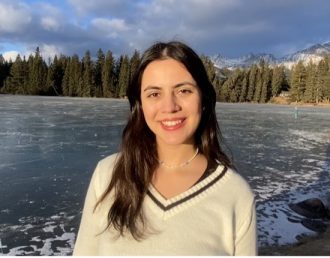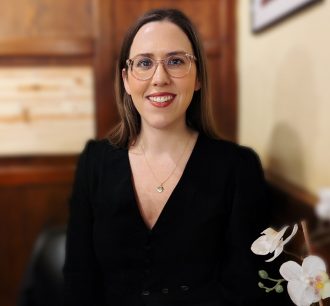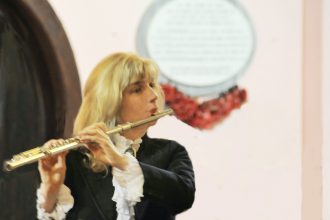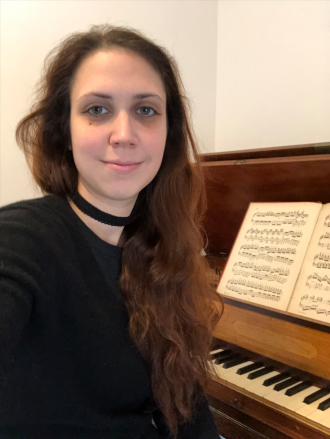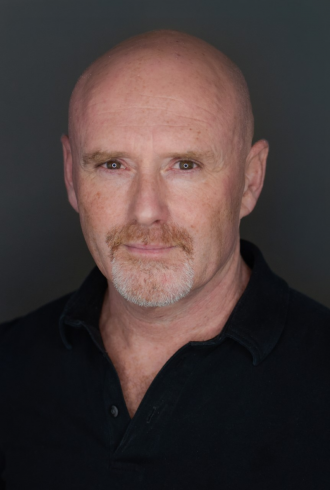Please click through the tabs below for information on doctoral projects currently being supervised in the Department of Music.
Biography
Shauna Louise Caffrey (she/her, sí/í) is an Irish Research Council Postgraduate Scholar at the department of Music, Maynooth University. Her PhD project, ‘Wayward Sisters: Witchcraft, Music and Magic on the Seventeenth-Century Stage’, explores the origins and impact of onstage sorceresses in Early Modern theatrical traditions, with a focus on the operatic stage. Inspired by her lifelong passion for folklore and mythology, her research seeks to explore the intersections of oral and literate cultures in Early Modern Europe, and to interrogate the ideologies transmitted through operatic archetypes.
She graduated with first class honours in both her B.A. (Trinity College, Dublin) and M.A. Music and Cultural History (University College Cork), and was awarded the Mahaffy Memorial Prize for her research into the origins and appearance of witchcraft in Henry Purcell’s Dido and Aeneas in 2017, and the Society for Musicology in Ireland’s 2019 Alison Dunlop Postgraduate Prize. Shauna is a founding member of experimental music collective Analog On, with whom she has performed throughout Ireland and in the U.S.A. She is also a performance artist and dancer, and received the title Mx Horror 2020 for her performances at Ireland's Women in Horror Festival.
Research Interests
- Restoration Theatre Music
- Liminality in Performance
- The Role of Music in Folklore and Mythology
- Queerness in Opera and Theatre Music
- Music and The Gothic
- Gender and Sexuality in Popular Music
- Experimental Music Performance
- Music and Trauma Studies
- Music and Sound in Horror Cinema
- Music in/as Ritual
Thesis
'Wayward Sisters': Witchcraft, Music and Magic on the Seventeenth-Century Stage
The witch has long been a subject of fascination for artists and audience members alike. Revered, feared, and the alternating subject of love or loathing, the witch has evolved from a seemingly omnipresent figure in world folklore, to the subject of musical, theatrical, and—in the last century—cinematic works. Manifesting in myriad guises and under numerous titles, today the witch presents ever more artistic potential, as the history of witchcraft is re-examined, the plight of the accused reinterrogated, leaving notions of cackling, broom-wielding spell-smiths cast aside. Witches have become the heroes and heroines of the postmodern age; the subject of children’s books, comedy shows, and advertising campaigns, the apprehension with which the subject of witchcraft was treated in the 16th and 17th centuries has largely dissolved. But what of these origins? What of the cackling, malevolent weavers of magic that inspired such terror and chaos on the Early Modern and Baroque stage, of the women and men whose trials have burned such a pregnant image into the Western psyche, and of the cultures that birthed them? The development of opera in the Baroque period saw the integration of the witch from folklore, drama and literature into the emerging genre. While sorceresses such as Armide and Medea terrorized the European stage, Britain experienced witchcraft of a different sort in Henry Purcell’s Dido and Aeneas, and countless masques and anti-masques. This project seeks to examine these witches and their magic on the seventeenth-century stage, to provide a cultural history of their origins, and to analyse their appearances. By shedding light on the witches' first significant foray into popular culture, this project will illuminate their prominent place in the modern psyche, as an alternating subject of fear and passion, and in their recent emergence as a feminist icon.
Professional Development/Experience
Teaching Assistant, Music and Trauma Studies (University College Cork), 2017-2018.
Contributor, GoldenPlec Classical, 2016-present
Course Instructor, Celtic Studies, Older Student Course (Centre for Talented Youth Ireland), 2019.
Course Instructor, Various Young Student courses, incl. Greek & Roman Mythology, Fantastic Beasts & How to Write Them (Centre for Talented Youth, Ireland) 2016-present
Teaching Assistant (Centre for Talented Youth, Ireland), 2014-2018.
Archive Manager, Trinity College Music Department Shellac & Vinyl Record Archive, 2014-2016.
Student Steering Committee Member, Society for Musicology in Ireland, 2020-present.
Conducting Masterclass with Eimear Noone, IMRO, August 2018
Active Music Making: The Kodály Approach Summer Course, Kodály Society of Ireland, 2014
Reference Presentations / Posters / Publications & Abstracts / Patents Publications:
Caffrey, Shauna Louise. ‘Mother, Monstrous: Motherhood, Grief, and the Supernatural in Marc- Antoine Charpentier’s Médée’. Irish Journal of Gothic and Horror Studies, no. 17 (2018): 13.
Presentations:
'Voicing the Liminal: Examining Gender and Liminal Identities through the voices of Operatic Witches', McGill Music Graduate Symposium, McGill University, March 2021.
'Wayward Sisters': Witches, Magic and Music on the Seventeenth-Century Stage’, Society for Musicology in Ireland Postgraduate Plenary, January 2021.
‘Sounding Wicked: Occult Soundscapes in The Chilling Adventures of Sabrina’, Gothflix 2020, Lancaster University, February 2020.
‘Otherworldly Thresholds: Liminality and Magic in Henry Purcell’s The Fairy Queen’, Society for Musicology in Ireland Annual Plenary Conference, Maynooth University, June 2019.
‘‘Like Dismal Ravens Crying': Supernatural Spectacle on the Restoration Stage’, Gothic Spectacle and Spectatorship, Lancaster University, June 2019.
‘Fear and Sensuality in New England: The Music of The Witch’,Folk Horror in the 21st Century, Falmouth University, September 2019.
‘Otherworldly Thresholds: Liminality and Magic in Henry Purcell’s The Fairy Queen’, Aigne Postgraduate Conference, UCC, December 2018.
‘She frights and frayes’: The Literary Origins of the Sorceress in Henry Purcell’s Dido and Aeneas’, Staging Witches: Gender, Power, and Alterity in Music AMS San Antonio Pre-Conference, October 2018.
Awards and Scholarships
Alison Dunlop Graduate Prize, 2019
Government of Ireland Postgraduate Scholarship 2018-2022
Mahaffy Memorial Prize, 2017
Membership in Professional Associations/Affiliations
Society for Musicology in Ireland
Contact Details
[email protected]
Biography
Chris is currently undertaking his PhD in Musicology under the supervision of Dr Laura Watson. Having studied jazz and contemporary music performance at Newpark Music Centre in Dublin in 2014, he then completed a master’s in jazz performance at TU Dublin in 2021, with his thesis ‘The Impact of the Picking Hand on Individuality in Jazz Guitar’ exploring the idiosyncratic approaches to guitar playing in jazz. Chris performs regularly throughout the South-east of Ireland with his jazz trio and runs his own music teaching business in Athboy, Co. Meath.
Research interests
- Improvisation
- Irish Jazz
- Jazz guitar technique and playing approaches
- Jazz performance
Thesis title
The Musical Language of Louis Stewart and its Impact on Jazz Culture
Thesis abstract
Louis Stewart (1944-2016) was an Irish jazz guitarist whose place in the history of jazz in Ireland is unparalleled. Over a period of fifty years, he performed and recorded prolifically, eventually enjoying international acclaim in the early 1970s after being recruited by the acclaimed American jazz musician Benny Goodman into his band. Stewart's success has had a profound impact on the jazz scene in Ireland and he is widely credited as the most important Irish jazz musician to date. However, despite having achieved international acclaim along with his unquestionable influence on the Irish jazz scene, there is a striking lack of in-depth knowledge about his musicality. To date, his improvisational techniques have yet to be put to page and studied, and there are no publications containing his musical scores, which is in stark contrast to other musicians of similar stature and influence. There is also little existing biographical research surrounding his approach to practice, performance, and wider views and opinions on jazz and music. Through the use of contemporary musical analysis techniques on selected music spanning Stewart's career, a comprehensive insight into the musical concepts that he utilised will be gained. These concepts will then be catalogued and compared with the concepts of current prominent jazz musicians that cite Stewart as an influence to determine whether his lasting impact in jazz is cultural, stylistic, or both. Documentation of oral history from former bandmates, students, and acquaintances will add an additional layer of understanding to this process by revealing Stewart's own musical perspectives and philosophies. It will also aid in quantifying Stewart's subsequent cultural impact in Ireland and abroad.
Professional development/experience
Instrumental teacher – Keys + Strings School of Music, Dublin (2016-2018)
Instrumental teacher – Castleknock School of Music, Dublin (2018-2022)
Performer (2009-Present)
Memberships of professional bodies
The Society of Musicology in Ireland
Awards
John and Pat Hume Doctoral Scholarship
Contact details
[email protected]
Biography
Kayleigh is completing a PhD in Musicology under the tutelage of Professor Lorraine Byrne-Bodley. Previously, she has obtained an MSLIS qualification in Rare Book and Special Collections Librarianship from Long Island University, and an MMus in Historical Musicology from University College Dublin. Her goal is to pair her background as a music researcher with her skills in library and archive services to work as a cataloguer and curator of manuscript sources and humanities collections, in between traveling the world with her dog.
Research interests
- Information History
- Digital Preservation
- Cataloguing and Metadata Standards
- Palaeography
- Music Manuscripts
- Early Music
- Codicology
Thesis information
Kayleigh’s thesis, aptly titled “A Case for Enhanced Access to Irish Musical Sources: The Pugin Collection in the Russell Library, Maynooth University,” is exactly that: a case study using a ‘dark’ archive of music and cultural heritage sources held at Maynooth as a plea for the importance of digital preservation in the humanities. This study will run alongside the enhancement of the collection’s metadata and preservation efforts through online access, and work to promote such methods as an integral and viable scheme for the survival of cultural heritage materials, as well as a call to improve access to underserved demographics.
Professional experience
Kayleigh has served as a cataloguer for various libraries and archives, chiefly Archbishop Marsh’s Library in Dublin and the LIU Post Archives with the Gardiner Foundation in New York. She has also taught music theory and private instruction and led tutorials in academic writing.
Publications
Out of Myself and My Country I Go: A Historical Discourse of the Troubadour in British Literature (International Medievalisms, Maynooth University, June 2019; The Society for Musicology in Ireland Plenary Conference, October 2020; forthcoming publication for Boydell and Brewer, Medievalisms).
Rare Books of Dublin: A History of the Book Through Ireland’s Written Artefacts (Commissioned for the CNY Irish Cultural Society, March 2019).
The Hibernian Catch Club Collection at Archbishop Marsh’s Library, Dublin: A Preliminary Assessment (UCD School of Music Graduate Colloquium, April 2017).
Awards & scholarships
Maynooth University’s John and Pat Hume Doctoral Scholarship
Gardiner Foundation Graduate Archival Fellowship
Memberships of professional bodies
American Library Association
American Musicological Society
Association of College and Research Libraries
Musique Medievale
Rare Books and Manuscripts Section (ACRL)
Society for Musicology in Ireland
Contact details
[email protected]
Biography
Darragh is a pianist, educator, composer and music examiner from Ireland. He is an Assistant Lecturer of Piano at the Royal Irish Academy of Music (RIAM), Ireland's most distinguished conservatoire. For this, he manages a team of Teaching Assistants, who are MMus/DMus students and External teachers. He is also a Local Centre Examiner with RIAM, examining music grades/recitals nationally, as well as a piano tutor in Maynooth University. Alongside a UK-based composer, Darragh has recently acted as an advisor and co-composer for bespoke piano tutor books. Several of his compositions are featured in these books, as well as in the Royal Irish Academy of Music’s piano albums. He previously worked for four years in Maynooth University’s Academic Writing Support Services, providing support to students of all disciplines with their writing concerns, through 1-to-1 appointments and courses which he taught and led.
His qualifications include a first-class honours in both a BA International in Music and a Masters in Performance and Musicology. He studied abroad in the University of Vienna for an Erasmus year. He is a holder of an Associate Diploma in Piano Pedagogy from RIAM and a Licentiate Diploma in Piano Performance from Trinity College London (Distinction). He also completed a Certificate in Third-Level Teaching and Learning. Darragh is currently in his final stages of a PhD in Musicology under the supervision of Prof. Lorraine Byrne Bodley, author of the most recent Schubert biography. He is the recipient of the John and Pat Hume Doctoral Scholarship Award. His research interests include Schubert’s contribution to piano duets and the role which piano duets play in pedagogy.
Research interests
- Piano pedagogy
- Performance practice
- Syllabus development
- Franz Schubert
- The piano for four hands genre
- Historical musicology
Thesis information
Title: Schubert’s Piano Works for Four Hands
Abstract: Franz Schubert’s engagement with piano duets began at the age of thirteen and continued until his untimely death in 1828. He elevated the piano duet to a new degree of sophistication, composing extensively for the medium – 34 works. He was a pioneer in this genre and no composer has rivalled his legacy since then in terms of the quantity and quality of his piano duets. There was a point in time during which the popularity of the four-hand genre rivalled that of solo piano, though many of these works were transcriptions/arrangements. Schubert’s works though were almost exclusively original piano duets. His output consists of extremely diverse genres and forms including sonatas, polonaises, marches, dances, variations, fantasies, overtures, rondos, divertissements, and a fugue. Of all his opus numbers published during his lifetime, his piano duets were second only to his Lieder in number. His artful complexity in the genre paved the path for Schumann, Brahms, and later composers to explore this area, as Schubert attracted new attention to the genre as a serious artform.
However, despite Schubert’s efforts in transcending the boundaries of the piano duet, the significance of his piano duets remains largely unexplored or at least significantly unaddressed in scholarship. Why is this? This thesis will investigate contributing factors that until now, have not been given significant attention. Much of the scholarly efforts in the nineteenth and twentieth century on Schubert were centred around his Lieder – though I argue Schubert was of a pioneer in the genre of piano duets too. More recently, scholars have begun to re-examine Schubert’s solo piano works, especially his ‘Wanderer’ Fantasy and his late piano sonatas. I posit that Schubert’s cultivation of the piano duet genre was equally authentic as his solo works and ask, why have his piano duets not been held in such a high regard? A selection of Schubert’s overlooked piano works are provided as case studies, providing performative and pedagogical perspectives. This research penetrates uncharted territory, as scholarship on Schubert’s piano duets is minimal and a more comprehensive study is due. Consequently, this thesis will bridge gaps in the reassessment of Schubert’s piano output, and it will contribute to the creation of new perspectives manifesting in a more comprehensive Schubertian representation
Professional Development/Experience
- First-Study Piano and Group Piano Tutor/Examiner, Maynooth University
- Assistant Lecturer in Piano, the Royal Irish Academy of Music
- Local Centre Examiner, the Royal Irish Academy of Music
- Assistant Lecturer in Piano (deputy panel), Technical University Dublin Conservatoire
- Sing Ireland piano accompanist (panel)
- Student Quality Assurance Reviewer with National Student Engagement Programme
- Previous: Graduate Teaching Assistant for Academic Writing Support Services, Maynooth University (2020-2024), piano tutor in the Jive Academy of Performing Arts and North Wexford Music School
Publications
RTÉ Brainstorm Article: https://www.rte.ie/author/1472971-darragh-gilleece/
Piano method books with QuietlifeMusic: editorial assistance and co-composer
Piano composition in The Royal Irish Academy of Music’s 2025 primary album
Piano composition in The Royal Irish Academy of Music’s 2026 grade 2 album
Co-author of Maynooth University's Handbook for Writing Tutors
Presented for: the Schubert Institute UK, Maynooth University Research Colloquia, Maynooth University Postgraduate Conference, the SMI and ICTM-IE Postgraduate Conference, SMI Plenary Conference
Pianist for various occasions; recent events included performing in the University of Wrocław, the Italian Institute of Culture and the Department of Foreign Affairs (Iveagh House).
Awards & scholarships
Erasmus Grant for Arqus course, University of Wrocław
HEA Covid Extension Award, provided by the Department of Further and Higher Education, Research, Innovation and Science
John and Pat Hume Doctoral Scholarship Award
Offered PhD Scholarship, DCU
Nominated for Alison Dunlop Prize for MA Thesis, Society for Musicology Ireland
Maynooth University Library Innovation Award
Offered MA Scholarship, Maynooth University
MUSE Award, Maynooth University
Swiss Embassy Award
Austrian Embassy Award
Arklow Music and Arts Scene Composition Award
Memberships of professional bodies
Society for Musicology in Ireland
Contact details
[email protected]
Biography
Aman Jagwani, from Mumbai, India, is an audio programmer, music technologist, and researcher. He completed his Bachelor's degree in Electronic Production and Design and Performance at Berklee College of Music, Boston, and later earned a Master of Science in Sound and Music Computing from Maynooth University. Currently, Aman is undertaking his Ph.D. at Maynooth University with supervisor, Prof. Victor Lazzarini, for which he received the Hume Fellow Scholarship Award. His research centres on audio DSP, embedded systems, FPGAs and interactive musical experience design. Aman is also involved in the Jazz and Electronic music scenes as a composer, producer and performer. He often integrates custom plugins, hardware devices and instruments into his work, merging his technological insights with his musical prowess. Additionally, Aman has experience with interactive and immersive sound and art installations, having contributed to projects in India, Europe, and the USA. This combination of experience and education makes Aman proficient in audio and music technology areas ranging from real-time audio programming, Audio DSP, Generative Music, Sound Design, Spatial Audio to Music Production.
Research interests
- Audio Digital Signal Processing
- Embedded Audio
- Interactive Audio
- FPGA Audio Programming
- Interactive and Improvisational Music
- Generative Music
- Immersive Sound Design
Thesis title and abstract
Title: Cross-adaptive synthesis - Creating a self-accompanying modular sound synthesis platform with FPGA-based SoCs to develop new forms of musical interaction.
Abstract: This project entails the development of a cross-adaptive modular sound synthesis system for FPGA-based System on Chips. First, a comprehensive modular sound synthesis platform will be created for FPGA chips. FPGAs are extremely powerful chips that support ultra-low latency, high sampling rates and very large computational ability, making them ideal for musical applications, especially real-time cross-adaptive synthesis. However, due to vast inherent programming complexities, these chips are relatively unexplored in the musical realm. The developed modular system will provide a flexible sound synthesis platform for this project and contribute heavily to the audio and music programming research field by providing high-level access to this platform. Next machine learning and pattern recognition algorithms will be developed, trained and deployed on the FPGA system on chip itself. This will allow real time sonic and musical interaction between performers and sound synthesis through musical gestures and statements on their instrument, enabling them to remain connected with their own performance as well as the current sonic and musical evolution taking place with the self-accompanying instrument. With the existence of several commonly used synthesis techniques such as additive, subtractive, frequency modulation and granular synthesis, the possibilities for investigation of sonic evolution in this context are vast. Furthermore, interactions can be deepened by expanding beyond just sonic or timbral manipulation into harmonic and rhythmic consideration as well. Lastly, a body of original creative work will be created to explore and evaluate the effectiveness of this system in the contexts of composition, live performance, video recordings and installations.
Professional experience
Sound Designer (2022 - Present)
– Effection - immersive installation at Method Art Gallery, Mumbai (2023) and India Art Fair, Delhi (2024).
– Forces of Nature - immersive installation at Infocomm India Convention (2024).
Audio Developer (2023 - Present)
– Bare-metal Csound - enabling the open source audio programming language to target micro-controller platforms for the first time (2023).
– Custom embedded audio software and application design for Chaal installation by Asim Waqif at Liminal Gaps exhibition, NMACC, Mumbai (2024) and IAB25, Jeddah (2025).
Music Producer (2018 - Present)
– Produced and mixed multiple albums and singles for Anubha Kaul-Aman Jagwani duo project.
– Produced and mixed music for artists - Ron Cha, Aakash Sridhar, Pritesh Walia, Luca Max etc.
– Produced music for clients - H Ajoomal Jewelry, Lodi, Blaupunkt Car Audio, Avyott AI etc.
– Playback production and engineering for live shows for artists - Adi, The Jukebox Collective, Anubha Kaul-Aman Jagwani duo, Berklee College of Music Showcase events.
Performer and Session Musician (2016 - Present)
– Drum-set performances for both independent and commercial music in India, USA, Europe.
– Live electronics and modular synthesizer performances in India, Europe and USA.
– Drum-set and live electronics/synthesis studio recordings for both independent and commercial music.
Educator (2020 - Present)
– Music Technology Lecturer at Maynooth University, Ireland. Teaching courses in music production, Interactive Systems, Human-computer interaction, Audio Programming at undergraduate and masters level.
– Music Technology Guest Lecturer at NMIMS School of Performing Arts, Mumbai.
– Guest Lecturer and workshop presenter in USA, Europe, East Asia and India covering topics of sound design, music production and audio programming.
– Private roster of drum-set performance and music technology students.
Publications
1. Conference Paper (UbiMus 2023)
Title: Creative Possibilities and Customizability of Live Performance Systems with Open Source Programming Platforms
Author: Aman Jagwani
Conference: Ubiquitous Music (UbiMus) 2nd International Symposium Date: November 2–4, 2023 Location: Ulster University, Derry~Londonderry Campus, Northern Ireland Proceedings: UbiMus 2023 Website
ISBN: 978-65-00-85069-7
Abstract: A vast array of open source programming platforms exists in the area of audio and music programming that can enable musicians, composers and programmers to create custom devices that can be used in live performance situations. This process can extend the creative involvement of the artist into the manifestation of the performance system itself, enabling better customization of the final artistic results towards their creative vision. This paper will present discussions, examples and ideas for devices that can be created with some of these platforms across both desktop and embedded environments and how these devices can be used to add a greater degree of creative expression during live performance. The paper will conclude with an overview of an ongoing project to develop a similar, accessible platform for FPGAs.
2. Talk (ADCx India) Title: Modular Audio Synthesis on FPGAs with the High Level Synthesis Development Flow
Authors: Aman Jagwani, Victor Lazzarini
Conference: Audio Developer Conference x (ADCx) India
Abstract: This talk will present a modular sound synthesis design approach for FPGAs using high level synthesis(HLS) tools. With their strong potential for high throughput, ultra-low latency and high sampling rates, field programmable gate arrays can be extremely beneficial for audio processing applications. Traditionally, FPGAs are highly complex to program, requiring specialized hardware design knowledge as well as knowledge of low level hardware description languages like VHDL and Verilog. HLS allows FPGAs to be programmed at a higher level of abstraction in languages such as C/C++ and system C, enabling greater accessibility and enhanced productivity. However, despite HLS offering a higher level of abstraction, it still requires specialized approaches, especially when applied to audio applications. The programming flow generally entails the design of a top level function that gets translated into a standalone hardware IP (intellectual property) module with its arguments defining inputs and outputs. Within the function, along with processing algorithms, optimization directives or pragmas have to be used for behavior, communication and interface definition. The generated IP module has to then be integrated and deployed in a complete hardware design using a set of downstream FPGA design tools such as Vivado and Vitis in the case of the AMD/Xiling FPGA environment. Within this context, this talk will introduce a set of inter-connectable sound synthesis HLS IP cores or modules, accompanied by a base audio system to exemplify the feasibility and design considerations of modular synthesis on FPGAs. The modules presented will include different types of oscillators, filters, envelope generators and other components of modular synths. Audio and video examples will also be presented.
3. Conference Paper (ICSC 2024)
Title: Bare-metal Csound
Authors: Aman Jagwani, Victor Lazzarini
Conference: 7th International Csound Conference (ICSC 2024)
Date: September 17–20, 2024
Location: Vienna, Austria
Abstract: Csound is able to target several platforms across desktop, mobile, web and embedded environments. This enables its vast audio processing capabilities to be leveraged in a wide range of sonic and musical contexts. Particularly, embedded platforms provide great portability and flexibility for users to design custom interfaces and signal processing chains for applications like installations and live performance. However, until now, embedded support for Csound was restricted to operating system-based platforms like Raspberry Pi and Bela. This paper presents our work on the development of Bare-metal Csound, extending the embedded support to ARM-based micro-controllers. We highlight the benefits and limitations of such systems and present two platforms on which we have conducted experiments - the Electrosmith Daisy and the Xilinx Zynq 7000 FPGA System-on-Chip. We also discuss potential use cases for Bare-metal Csound as well as future directions for this work. Bare-metal Csound and outlines future directions for development.
4. Installation (ICSC 2024)
Title: Csound-FPGA Integration
Authors: Aman Jagwani, Victor Lazzarini
Conference: 7th International Csound Conference (ICSC 2024)
Abstract: With the development of Bare-metal Csound, embedded systems with ARM-based CPUs can now be targeted to run Csound audio programs. This installation will demonstrate the potential of this development through an interactive, generative Csound piece running on a Digilent Zybo Z7020 board, which contains a Xilinx Zynq7000 SoC. Csound’s generative and synthesis capabilities will be interfaced with motion-sensing through LIDAR sensors to capture and convert motion in any of the common spaces of the conference into varied ambient sonic results. The purpose of this installation is to create an interactive ambience for a common space and to showcase the potential and portability of Bare-metal Csound
5. Conference Paper (UbiMus 2024)
Title: Interactive Audio Toolkit: Creating Sonic Experiences and Installations With Low-cost, Low-power Microcontrollers
Authors: Aman Jagwani, Victor Lazzarini
Conference: Ubiquitous Music Symposium (UbiMus 2024)
Date: October 31 – November 2, 2024
Location: University of Saint Joseph, Macao (China)
Editors: Gerald Estadieu, Marcello Messina, Carlos Gómez, Damián Keller, Guido Kramann, Martin Koszolko
Abstract: Interactive sound installations and experiences are increasingly prevalent in museums, galleries, events, and various spaces worldwide. These installations are often powered by microcontroller boards running programs that control interactivity and possibly even audio processing. Commonly used microcontrollers such as the ESP32 and Raspberry Pi Pico are generic, necessitating custom implementations for audio-specific functionalities. Existing audio libraries often have limited signal processing features and may not be designed with interactivity in mind. This paper presents the Interactive Audio Toolkit, which focuses on the seamless integration of sound generation with sensors to create interactive sound experiences with low-power, low-cost microcontrollers. This C++ toolkit is structured around sensor input and audio output classes, providing a simple interface to generate flexible audio responses from sensor interactions. This paper details the toolkit’s structure, components, and interface, highlighting its ability to foster new forms of sonic and musical interactions for artists and audiences. A case study of an installation utilizing the toolkit is also presented.
Awards & Scholarships
Undergraduate:
- Berklee Achievement Scholarship
- Armand Zildjian Percussion Endowed Scholarship
- Brian Eno Production Award
Masters:
- Maynooth University Taught Masters Scholarship
PhD:
- John And Pat Hume Doctoral Award: Hume Fellow Scholarship
Contact details
Email: [email protected] / [email protected]
Biography
William Kearney is an Irish Research Council Postgraduate Scholar at the Department of Music, Maynooth University, Ireland. His PhD research takes a choreomusicological approach to the study of embodiment in participatory Irish set dancing contexts with a particular focus on the traditions of the Cork/Kerry/Limerick border region of Ireland.
Research interests
- Irish traditional music and dance
- Ethnochoreomusicology
- Ethnomusicology
- Embodiment
- Performance Studies
Thesis title
Passing It On: The Significance of Gesture in the Embodiment of Irish Traditional Dance Music and Dance
Thesis abstract
In the literature on Irish traditional music and dance, a certain level of ambiguity is typically taken as a given when thinking about transmission and embodiment. Owing to the predominately oral nature of these art forms, learning by listening and imitation are rightly viewed as key stages of embodiment, yet little discussion is given to how crucial information relating to performance practice (style) and aesthetics is transmitted and internalised in these processes. Taking the starting point of viewing embodiment as multimodal, multisensory, and mimetic, this research aims to foreground the role of gesture - whether expressed through the dancing body, a melodic line played on an instrument, or both - positing gesture as a conduit through which such sophisticated knowledge is communicated and interpreted in these oral art forms. As such, it is argued that this interpretation is influenced by one’s culture, while the degree to which it is embodied is dependent on individual interest, desire, and motivation. In addressing these questions, a choreomusicological approach (an approach which underscores the interrelatedness of music and dance) is applied to the set dancing traditions of the Munster region of Ireland, positing that the music and dance as practice in these participatory art forms, can be viewed as different gestural iterations of a shared embodied ideal of performance style and aesthetic.
Professional development/experience
Department of Music, Maynooth - Dec 2021- present
Lecturer on the Introduction to Irish Traditional Music module for 23-4 and 24-5 academic years.
Tutor for first year undergraduate music theory module for 23-4 academic year.
I have graded papers for several undergraduate modules delivered by the department.
Technical Editor of Ethnomusicology Ireland - April 2023 to present
Publications
Kearney, William. 2024. ‘Towards a Multimedia Choreomusicology: Exploring the Potential of Digital Animation as a Tool in Sound-Movement Research Dissemination.’ In Reconsidering Knowledge Production and Inclusion/Exclusion in Dance Communities, edited by Rebeka Kunej and Ann R David. Ljubljiana: Založba ZRC.
Kearney, William. 2024. ‘Learning by Ear: Multimodal Listening and the Embodiment of Irish Traditional Music and Dance’. In British Forum for Ethnomusicology & International Council for Traditional Music Ireland Joint-Annual Conference. Cork, Ireland. https://mural.maynoothuniversity.ie/id/eprint/18441.
Awards & scholarships
Government of Ireland Postgraduate Scholarship 2023-25
Hume Fellow Scholarship from Maynooth University 2021-23
Memberships of professional bodies
Member of the International Council for Traditions of Music and Dance
Member of The Society of Ethnmusicology
Contact details
[email protected]
Biography
Thibaud is currently undertaking his PhD in Music technology under the supervision of Prof. Victor Lazzarini and Dr. Gordon Delap. Having studied jazz performance at Newpark Music Centre in Dublin in 2014, he then completed a master’s in music technology at Jean Monet University (St-Etienne, France) in 2017. After working as a technician for four years at the Studio for Research and Creation in Computer Music (SCRIME, Bordeaux, France), he embarked for a couple more years as a developer and system administrator in the corporate world. After this valuable but somewhat taxing experience, he happily ran back into the warm embrace of academia.
Research interests
- Linux and open-source software
- Modern c++, real time audio
- Digital scoring
- Hardware and embedded systems
Thesis title and abstract
The Digital Performance Score: Hardware interfaces for elastic timelines
Designing Human-Machine interactions for live performance can require representation and control of events through time. Several theoretical models have been developed to that effect over the years: some are implemented in software of various complexity. When it comes to hardware however, time is mostly understood as linear, unique and regular. This is notably the case for systems using one of the most prevalent physical interface to edit and play sequences, the button grid, with its rich history, from early drum machines to the ubiquitous Digital Audio Workstation controllers of today. This research, drawing from both fields of interactive media notation and New Interfaces for Musical Expression, will explore non-linear temporal models and propose an implementation of common physical interfaces and interactions better suited to these models. A prime candidate for this exploration are the interactive scores as implemented in the software ossia score, where branching timelines can be drawn to execute media sequences and their processing interactively, in parallel scenarios of variable speed and duration. The open-ended scheduling ossia score enables necessitates the elaboration of a divergent approach to translate to a hardware interface for musical expression. Which computing challenges would such a translation entail? This inquiry would first have to establish the minimal essential requirement in score’s graphical user interface, and in its temporal model.
Professional experience
Technical assistant at SCRIME (2017-2021) Software developer and system administrator at Euclid trading systems (2021-2024)
Publications
B. Serpette, C. Rocailleux and T. Keller (2020). "Architeture logiciel de la sortie de residence d’Aleas", Journées d’informatique musicale, October 2020.
Jaton, G. and T. Keller (2020). "Realitée sonore augmenté / réalité virtuel audio", Colloque International MONDES SPATIALISÉS. Composition et spatialisation sonore et musicale dans les environnements en Réalité Virtuelle, Augmentée et Mixte, November 2020.
Keller, T. and J.M. Celerier (2019). “Switching "Le SCRIME" over to Linux as a complete novice”, Linux Audio Conference, (LAC 2019), Stanford, February 2019. CA, USA.
Mott, I. and T. Keller (2019). “Three-dimensional sound design with Mosca”, 18º Encontro Internacional de Arte e Tecnologia, Faculté des beaux Arts, November 2019. Lisbonne, Portugal.
Awards & scholarships
IRC Ulysses scheme (researcher exchange program)
IRC Entreprise partnership scheme (Doctoral scholarship)
Memberships of professional bodies
Member of the ossia.io non-profit
Contact details
[email protected]
Biography
Hui Han Lui is currently completing a PhD in the Department of Music at Maynooth University, under the supervision of Dr Antonio Cascelli and Prof. Alison Hood. Her research explores a selection of 19th-century piano techniques and their application on both modern and historical pianos.
Prior to pursuing her PhD, she has completed a Bachelor of Music (Performance) from Universiti Putra Malaysia and MA in Performance and Musicology from Maynooth University, both with first class honours. She has an interest in performance studies and focused on researching body movements and gestures in piano performance during her MA studies. She completed a thesis titled Formalizing Body Movements and Gestures in Piano Solo Work: Estampes by Debussy during her MA studies.
As a pianist, her achievements include obtaining a Licentiate of Trinity College London (LTCL), being selected as one of the scholarship recipients of the YAMAHA Scholarship Program 2017, as well as one of the finalists at the First International Aswara Piano and Vocal Competition.
Research Interests
- Piano performance
- Historical keyboard instruments
- Piano techniques and playing approaches
- Body movements and gestures
Thesis
Reimagining 19th-Century Piano Techniques from a 21st-Century Perspective
This research reimagines a selection of nineteenth-century piano techniques, specifically those by Johann Nepomuk Hummel, Carl Czerny, Ludwig Deppe, and Theodore Leschetizky from a twenty-first-century perspective. These historical techniques were studied mainly through historical treatises or technique books where instructions on physical approaches, one of the most fundamental aspects of learning playing techniques, were focused on in detail. Through this, the resulting body and hand postures, positions, and movements were observed, and the implications of these researched techniques on musical aspects such as touches, tones, dynamics, and phrasing were studied, mainly on the modern piano and briefly on historical piano.
In carrying out this study, musicological research served as the foundation, while different methodologies such as autoethnography and motion capture were used to extract findings from two different perspectives. The nineteenth-century techniques, reimagined and assimilated into modern piano playing, were showcased through the final recordings of performances where changes can be observed in aspects such as clarity, touches, dynamics, and phrasing. The demonstrations, musical examples, and recordings extends its contribution to both historically informed and modern piano performances. It provides an additional aspect to consider in the preparation of historically informed performances (HIP) and opens the possibility for modern pianists to take inspiration from historical techniques. It helps modern pianists understand the selected nineteenth-century techniques, and make more informed decisions when assimilating them, while offering a potential solution to playing historical keyboard instruments.
Professional development/experience
Hui has provided one-to-one piano lessons to undergraduate piano majors, taught and examined first- and second-year group piano lessons, and delivered tutorials for music theory modules. Additionally, she has worked as a piano teacher for about ten years, preparing students for ABRSM, Trinity, and RIAM graded exams, as well as the Leaving Certificate practical exam.
To further develop her knowledge and skills in historical piano performance, Hui has also attended summer schools on historical instruments, including the Historical Piano Summer Academy 2023 in Ghent, Belgium (passive participant, as part of the Early Muse short-term scientific mission) and the 2024 Early Music Summer Course in Magnano, Italy, where she studied clavichord and fortepiano. Furthermore, she is also learning the clavichord as part of her ongoing exploration on historical keyboards.
Awards and Scholarships
The Arts Council Ireland 2024 Agility Award in Music
John and Pat Hume Scholarship
YAMAHA Scholarship Program 2017
Publications
Hui Han Lui, ‘Reimagining the use of 19th-century techniques on historical piano: from the perspective of a 21st-century pianist’, RUUKKU - Studies in Artistic Research, 21 (2024), https://doi.org/10.22501/ruu.2100311
Hui Han Lui, ‘Perception Gaps Between Modern and Historical Piano— A Way Towards Emancipation’, Early Muse Blog, 29 May 2024 https://earlymuse.eu/publications/blog/perception-gaps-between-modern-and-historical-piano-a-way-towards-emancipation-by-hui-han-lui-maynooth-university-ireland/
Presentations
Interweaving the Past in the Present: Integrating Hummel’s techniques in Mozart’s Sonata in D
Nov 2024 —the 47th National Conference of the Musicological Society of Australia
The Reconciliation of Artistic and Empirical Perspectives in the Study of Body Movements and Sound through Learning the Late 19th century Piano Techniques
Jan 2023 — Joint SMI/ICTM-IE Postgraduate Conference, University College Dublin, Ireland
Learning the Late 19th century Piano Techniques: From the Perspective of a Performer-researcher
Jan 2023 — BFE/RMA Research Students’ Conference 2023
Effects of Classical Techniques on Body Movements and the Sound of a Modern Grand Piano: Hummel and Czerny, Performance: Waldstein Sonata 1st Movement
Mar 2022 — Perform_Live, National Concert Hall
Effects of Classical Techniques on Body Movements and the Sound of a Modern Grand Piano: Hummel and Czerny
Jan 2022 — SMI/ICTM-IE Postgraduate Conference
Jan 2022 — 2022 BFE/RMA Research Students’ Conference, Plymouth University, Jan 2022
Evolution of Body Movements: Piano Techniques and Playing Approaches in Classical Period
Sep 2021 — Doctors in Performance 2021, Tallinn, Estonia
May 2021 — SMI/ICTM-IE Joint Plenary Conference, Trinity College Dublin
Contact Details
[email protected]
[email protected]
Biography
Dylan Murphy is a Contemporary Classical Art Music Composer/Performer, who hails from Galway in Ireland’s West, but is currently based in Dublin, Ireland. He is currently researching 20th Century Irish Literature in relation to contemporary art music composition at Maynooth University under the supervision of Dr Martin O’Leary, and is also currently a lecturer in the Theory Department of BIMM Dublin. He has released music in a Jazz context previously, which has been said to “culminate in this delicious melange of blues styles”; but has gone on to focus on Contemporary Classical Art Music composition and performance with the release of his first piece, Iridescence - for solo piano, performed by Izumi Kimura. His influences include Arnold Schoenberg, Igor Stravinsky, Lili Boulanger, but are not just limited to a contemporary classic tradition, he has also found influence from Miles Davis, John Coltrane, Julian Lage and Bill Frisell, among many others. His sound can be said to be derived from the fusing of this background: Jazz along with Contemporary Classical, culminating in this tonally dense soundscape.
Research interests
- Contemporary Classical Music Composition Jazz Composition
- Classic Literature
- 20th-Century Music
- French Impressionist Music Serialism
- Traditional Jazz
- Modal Jazz
- Traditional Irish Music in Contemporary Setting
Thesis title
Juxtaposed Art Forms: 20th-Century Irish Literature and Contemporary Classical Art Music – the Interaction and Impact on my Music.
Thesis abstract
Art influences art; throughout my previous studies, MA of Composition at Maynooth University, literature played a key role in its culmination; and thus, the research being conducted in this PhD is based upon the interaction of literature with Contemporary Musical Composition.The main focus within will be of new music composition in relation to key writers of 20th Century Irish Literature, that of: James Joyce, Samuel Beckett and W. B. Yeats. The new music composed will be influenced by the literature in a variety of ways, but primarily the forms and techniques uncovered within the literature, that will be incorporated to the musical idiom. There will also be this question of modernist vs. postmodern thought within the newly composed music as well as the case studies (music/literature) analysed, along with a question of Irishness within the composed music and case studies.
Professional development/experience
Lecturer – BIMM Dublin 2021 – Present
Publications
“Iridescence – For Solo Piano”, performed by Izumi Kimura. https://youtu.be/8TgLxxsaOOw
Contact details
[email protected]
Biography
Inês Nunes Trindade is a PhD student at Maynooth University (ERC Grant, 2024-28), as part of Professor Karen Desmond’s research project ‘Polyphonic Singing and Communities of Music Writing in Medieval Britain and Ireland, c. 1150 to c. 1350’ (BROKENSONG). Having finished a BA Degree in Musical Sciences at NOVA University of Lisbon, she completed her MA Degree in Historical Musicology in 2024, at the same institution, with a dissertation titled ‘Communion Antiphons: Liturgical and Musical Identity in the Sources of Braga and Guimarães (12th-17th centuries)’, under the supervision of Professor Elsa De Luca. She actively collaborates with the Early Music Study Group, at CESEM, where she is a member in the project ‘Echoes from the Past: Unveiling a Lost Soundscape with Digital Analysis’, having taken part in the projects ‘The Musical Manuscripts of the Belém Monastery’ and ‘Texts and voices lost and found. Recovering, reconstituting, and recreating musical fragments (c.1100-c.1600)’.
Research interests
- Early Music
- Plainchant and Polyphony
- Archivism
- Baroque Violin
Thesis title and abstract
Uncovering the Plainchant at Worcester Cathedral (12th-14th century)
The Worcester Cathedral Library preserves an incredible collection of complete medieval manuscripts and an important set of fragments taken from their bindings. To uncover the plainchant, the point of departure for this research is a unique Worcester Service Book from the 13th century, known as Antiphoner F. 160, compiled in the Cathedral. This source is relevant since it contains all the chants for the performance of the daily religious services. With 355 leaves, it compiles several books, namely an Antiphoner (Temoporale and Sanctorale), a Processional, the office and mass for Corpus Christi and for the Visitation, a Calendar, a Psalter, a Hymnal, a Collectar, and a Gradual (with Temporale and Sanctorale content, as well as troped Kyries, Glorias, Sequences, troped Sanctus and Agnus). By indexing and analysing the musical content, I aim to open up new possibilities for identifying and understanding the peculiarities of the plainchant and the musical notation in Worcester, having in mind the relationship with Norman and Sarum sources. Furthermore, this output will contribute to one of the goals of the BROKENSONG project, that is, to find thematic concordances with the texts of Worcester’s polyphonic and monophonic compositions.
Professional development/experience
Research projects:
PhD researcher, Polyphonic Singing and Communities of Music Writing in Medieval Britain and Ireland, c. 1150 to c. 1350, (2024-28).
Researcher, Echoes from the Past: Unveiling a Lost Soundscape with Digital Analysis (2023-ongoing).
Research fellow, Texts and voices lost and found. Recovering, reconstituting, and recreating musical fragments (c.1100-c.1600) (2023-24).
Researcher, The Musical Manuscripts from the Monastery of Belém: The Exploration of an Unknown Hieronymite Tradition (2022-23).
Research fellow, CONCHA - The construction of early modern global Cities and oceanic networks in the Atlantic: An approach via Ocean's Cultural Heritage (2022).
Event organization:
Digital Technologies Applied to Music Research: Methodologies, Projects and Challenges, NOVA University of Lisbon, Portugal, June 27-29, 2024.
Lost & Found: Traces of Early Music An International Colloquium on Fragmentology, NOVA University of Lisbon, Portugal, July 19-22, 2023.
5th Transnational Opera Studies Conference, NOVA University of Lisbon, Portugal, July 6-8, 2023.
XI Meeting of Research in Music, University of Aveiro, November 10-12, 2022.
Publications & presentations
Publications:
Trindade, Inês Nunes. 2025. “The Tridentine Reform in Braga Liturgy: The Melodies of Communion-Antiphons as Case-Study”. In Early Centuries of Franco-Roman Chant in Iberia, ca. 1050–1300 (accepted).
Trindade, Inês Nunes. 2025. “A Liturgia Bracarense: um olhar sobre as melodias das antífonas de comunhão”. In Incipit 13 (accepted).
Trindade, Inês Nunes. 2024. “As Antífonas de Comunhão: Identidade Musical e Litúrgica nas Fontes de Braga e Guimarães do séc. XII ao séc. XVII”. Master Thesis, NOVA University of Lisbon, Portugal.
Alvarenga, João Pedro d'; Trindade, Inês Nunes. 2023. “Lost&Found Recovering, reconstituting, and recreating musical fragments (c.1100-c.1600)”. Paper presented in Dia da investigação e inovação 2023 (DII23).
Oral Presentations:
“The Veneration of Saint Scholastica in the British Isles: The Worcester Gradual F. 160 as Case-Study”, Joint SMI/ICTM-IE Postgraduate Conference, Trinity College Dublin (Ireland), January 2025.
“As melodias das antífonas de comunhão do Gradual da Sé de Braga do século XVII”, XIII Meeting on Research in Music, Conservatório Regional do Algarve (Faro, Portugal), November 2024.
“The Liturgy of Braga: Uncovering the Melodies of Communion Chants”, Digital Technologies Applied to Music Research: Methodologies, Projects and Challenges (Lisbon, Portugal), June 2024.
“A Liturgia Bracarense: um olhar sobre as melodias dos cantos de Comunhão”, XVI Medieval Studies Workshop (Porto, Portugal), April 2024.
“De pergaminho a biblioteca digital: O cantochão de Braga e Guimarães como estudo de caso”, 4º National Meeting of Researchers of the IN2PAST (Lisbon, Portugal), February 2024.
“Antífonas de Comunhão: Identidade Litúrgica e Musical nas Fontes Bracarenses do séc. XII ao séc. XVII”, Post-Graduate Forum in Studies in Music and Dance (Lisbon, Portugal), December 2023.
“The manuscript P-Ln L. C. 259: an antiphonary from the monastery of Belém”, MEDyREN (Zamora, Spain), April 2023.
Awards & scholarships
- PhD Studentship BROKESONG Project (ERC 2024-28).
- Research Fellow Grant PTDC/ART-PER/0902/2020 LOST & FOUND Project (FCT 12 months), March 1st 2023-24.
- Short-Term Scientific Mission of COST-Action, by the Early Muse (1000€). August 17-24, 2023.
- Santander Open Academy (1000€). January 2023.
- Scientific Initiation Fellow Grant H2020- MSCA-RISE-2017 CONCHA Project (FCT 1 month), August 2022.
Contact details
[email protected]
Biography
Claire O’Donnell is currently pursuing a PhD in musicology at Maynooth University, focusing on Irish composer John Field’s connections to the 18th-century Italian pedagogical traditions of partimento and solfeggio. She is a classical pianist and composer specializing in historical styles who brings an interdisciplinary background to her research projects. A former professional translator with a Research Master’s degree in Sociolinguistics and a Professional Master’s degree in Translation, Claire was drawn to historical improvisation through Robert Gjerdingen’s linguistics-inspired approach to music analysis. Since 2019, she has immersed herself in the study of schema theory, partimento, and solfeggio, while regularly self-publishing compositions and partimento realizations. Claire is also a private teacher of piano and historical improvisation and composition.
Research interests
- Historical improvisation and composition
- Partimento, thoroughbass and counterpoint
- 18th-century Italian Solfeggio
- Historically informed music theory and analysis
- Early 19th-century classical music
- Piano performance and pedagogy
Thesis Title
John Field and the Nocturne: How the Italian Partimento and Solfeggio Traditions Shaped the Genre
Abstract
Despite Irish composer John Field’s (1782-1837) reputation as a skilled improviser and ‘inventor’ of the piano nocturne, the role of historical improvisation practices in the development of this celebrated genre remains unexplored, leaving an important gap in our understanding of how this music was shaped.
The role of improvisation - a ‘forgotten’ skill - has largely been overlooked in Western classical music in modern times. Yet, recent scholarly research has revealed that 18th and 19th-century pedagogy involved a strong focus on improvisation. Specifically, a tradition known as partimento (harmonic exercises) and solfeggio (melodic exercises), which originated in 18th-century Italian conservatories, taught musicians to speak a ‘common language’ by internalizing a rich variety of musical patterns. This tradition has been rediscovered by modern scholars, who are using historical pedagogical models to revive the skills of improvisation and cultivate a more integrative approach to classical music education.
John Field’s nocturnes are significant because they embody the transition between Classical and Romantic aesthetics and established a model for composers of the Romantic era (1800-1850). Having trained under Italian teachers Tommaso Giordani (c.1730-1806) and Muzio Clementi (1752-1832), Field’s connection to the partimento tradition is unexplored, raising questions about the traces of improvisational practice in the genre’s development.
My research will begin by examining Field’s training and the broader historical context. It will then analyze pedagogical works by his teachers and Field’s own nocturnes, using a comparative lens to demonstrate how he used and transformed conventions in the emerging nocturne genre. Finally, I will describe harmonic models used by Field and provide practical demonstrations through original compositions in the nocturne style.
As a pianist, composer and improviser, I aim to contribute new models for the growing community of musicians interested in historical improvisation, while demonstrating Ireland’s link to the partimento tradition for the first time.
Professional development/experience
Formerly a professional translator (2008–2017) and a musician since childhood, Claire began retraining as a piano teacher in 2018 through private instruction and RIAM examinations. Her discovery of historical improvisation in 2019 was transformative, sparking a deep passion for the field. Since then, Claire has pursued various training opportunities, including over two years of active participation in John Mortensen’s Improv Planet. She also attended the MentiParti intensive summer workshops on 17th- and 18th-century Italian traditions of partimento and solfeggio in both 2021 and 2023 and has taken private lessons in partimento and counterpoint. She currently works as a private piano teacher while pursuing her PhD.
Publications
“Improvising with the Preludes of Tommaso Giordani: Analysis Through a Pedagogical Lens” – Paper presented at the Chigiana conference “Performing Classics Today” in Siena, Italy, December 2024
Awards & scholarships
Improcomp scholarship for active participation in the “Piano Improvisation in the 18th and Early 19th Centuries” workshop in Perugia, Italy
Memberships of professional bodies
Society for Musicology in Ireland
Contact details
[email protected]
https://www.youtube.com/@ClaireODonnell
Biography
Irish flautist Eilís O'Sullivan graduated from the Cork School of Music and, as a scholarship student, continued her studies at the Royal Scottish Academy of Music and Drama. She graduated with B.A. (Hons) and M.Mus with Distinction. Eilís is much in demand as a solo, chamber and orchestral musician, having broadcast and toured extensively. Throughout her career she has been distinguished with many awards including the Silver Medal of the Worshipful Company of Musicians, London and first prize in the Governor's Recital Prize Competition at the Scottish Conservatoire. Eilís has performed widely as a soloist. Recitals include performances at St. Martin in the Fields, London, Sir Adrian Boult Hall, Birmingham, NCH Dublin, with Crash Ensemble in Germany, for the Prince of Wales at Hollyrood Palace, Edinburgh and at the main concert hall and music club venues throughout Ireland, Britain and Germany. Guest concerto engagements include performances in Seattle, USA, Glasgow & Edinburgh, Scotland, and as a broadcast with the RTE Concert Orchestra, Dublin. As an active chamber musician some of Eilís' recent performances include Debussy's Sonata for Flute, Viola and Harp, Beethoven's Trio for Flute, Bassoon and Piano, Wind Trios for ClassicalKids, recitals with Hifilutin flute quartet and NCH appearances with the Orpheus Trio. As an orchestral musician she has freelanced with the RSNO (Royal Scottish National Orchestra), SCO (Scottish Chamber Orchestra), BBC Wales, NSOI (National Symphony Orchestra of Ireland) and RTÉCO (Radio Telifis Éireann Concert Orchestra). Currently Eilís is a lecturer at the MTU Cork School of Music and is a PhD student at Maynooth University working under the supervision of Prof. Fiona Palmer and Dr Antonio Cascelli.
Thesis title
A Flautist’s Exploration on ‘I-Thou’ (I U): (U I) ‘Thou-I’ [An Artistic Research into and through the performances of Olivier Messiaen’s Le Merle Noir (1952) and Luciano Berio’s Sequenza 1 (1958)]
Contact details
[email protected]
Biography
Born in France within a family of musicians, Sydney Rime started her journey as a professional pianist and piano teacher when she was in her late teens, while studying at the Conservatory and the University in Paris. After graduating with multiple academic and performance degrees (music history, literature, piano, music theory, accompaniment), she specialised in early music and historically informed performance.
Having a Breton heritage, she was always eager to find connections between traditional and classical music. In 2022, she moved to Ireland and started a Ph.D. in musicology at Maynooth University under the supervision of Dr. Adrian Scahill. Her thesis explores the legacy of the Celtic Revival folksong collections published at the turn of the twentieth century. Outside her doctoral research, Sydney runs her own music teaching business, teaches a module at Maynooth University, plays the organ for church services, and works on a debut album of piano pieces inspired by Breton folklore.
Research interests
- Connections between traditional and classical music
- Pan-Celticism and music
- Traditional music of Brittany, Ireland, Wales, Scotland, Isle of Man, and Cornwall
- Folksongs
- Breton composers
- Music and Literature
- Historical Keyboards
Thesis title
The legacy of the fin-de-siecle Celtic Revival folksong collections (1880-1910)
Thesis abstract
This research focuses on the legacy of Irish, Welsh, Breton, Scottish, Manx and Cornish folksong collections for piano and voice published at the turn of the twentieth century (1880-1910). These collections mainly consist of folk tunes collected from oral or written sources, arranged for a parlour setting (piano and voice). In fewer instances, the songs (music, or text, or both) were composed specifically for the collections. There have been many debates around the authenticity of these folksongs, but there is a gap of knowledge when it comes to their transformation and legacy. Initially intended for a domestic use, these songs were played in concerts during the early twentieth century, and diffused by the means of school manuals, radio broadcasts, or pan-Celtic festivals. The 1970s folk revival saw a renewed interest in these songs, with an attempt to transform them into something more “authentic”. Some of these late nineteenth and early twentieth century volumes have been forgotten today, but clear evidence of their legacy remains in contemporary Celtic music.
Through a musical analysis of these collections, research into their history and context, and interviews of people who have been inspired by this repertoire, I am attempting to answer the following questions: how did these folksong collections contribute to the development of different forms of Celtic music in the twentieth and twenty-first centuries? What was their role in the creation of a pan-Celtic musical identity?
By looking at the transmissions of these folksongs in an innovative way, this research provides new perspectives on folksong collections of this period, and a contemporary re-thinking of the terms “Celtic” and “Pan-Celtic” as applied to music.
Professional development/experience
Pianist (over 100 concerts as a solo keyboardist (piano, fortepiano, clavichord, organ, harpsichord) and over 250 concerts as part of ensembles (chamber music, orchestra, choir, accompanist).
Organist for Blessington union of parishes (since 2024)
Piano teacher (since 2010) in conservatories and music schools (MJC de Chaville, Conservatoire de Lorient, Ecole de Musique de Chateaulin, Piano Academy of Ireland, Ceola Music academy…) and private lessons
Lecturer for MU254 module (ensemble performance, classical music) at Maynooth University (since 2024)
Publications
“Music and historical re-enactment” in Soanyway magazine (Early music special insert), 2020
Presentations
“Investigating the legacy of folksong collections published during the Celtic Revival (1880-1910): a methodology. ” SMI/ICTMD conference, Trinity College Dublin, January 17 2025- “The legacy of Harold Boulton’s folksong collections”, International Nineteenth Century Studies Association inaugural conference, Durham University, July 10 2024.
“Mapping Celtic Songs – Journey maps of folksongs published during the fin-de-siècle “Celtic Revival” Aberdeen University, March 28-29th 2024
“Nineteenth century folksong collections and the development of a Breton musical identity” BFE / RMA conference “identity”, Cardiff University, January 10 2024
“The idea of the “popular” in Harold Boulton’s folksong collections – from the Victorian parlour to the traditional music scene” North American British Music Studies Association Online Symposium “the popular”, August 10th 2023
“Bourgault-Ducoudray’s folksong collections – towards a pan-Celtic musical identity”. SMI / ICTM Postgraduate Conference, University College Dublin, January 2023 Dublin)
Awards and Scholarships
Arts Council Agility Award 2024
Memberships of professional bodies
Society for Musicology Ireland
British Forum for Ethnomusicology
International Nineteenth Century Studies Association
North American British Music Studies Association
Contact details
[email protected]
Biography
2021 is Peter Shannon’s seventh year as Artistic Director and Conductor of the Jackson Symphony in Jackson, Tennessee. He was the first Artistic Director and Conductor of the Savannah Philharmonic, in Savannah Georgia, from 2008 to 2018, before deciding to relocate with his family to his native Ireland. He commutes regularly to the USA and mainland Europe to conduct. As a Bachelor of Music student at University College Dublin and a member of the RTÉ National Chamber Choir, he began studying conducting under the Irish conductor, Colman Pearce. In Germany, Shannon began postgraduate studies in Weimar at the Franz Liszt Hochschule für Musik, founded by the great pianist Franz Liszt. He earned a second postgraduate degree at the Karlsruhe Hochschule für Musik. Following in the steps of J.S. Bach who conducted the Leipzig Collegium Musicum, Shannon, at age 26, was appointed conductor of the Collegium Musicum Orchestra in Heidelberg, Germany, the county’s oldest university.Peter Shannon has always had a strong desire to connect Music and Medicine. Recognizing the holistic connection between music and healing, Peter has developed and shepherded programs in the USA at Hospitals, Cancer Institutes and Hospice settings for over ten years. He is the founder and director of the American non profit “American Institute for music and Healing” (AIMH). At the AIMH, Shannon has partnered with Dr. Jacqueline Huntly, MD, MPH, to further grow the work and abilities of the musicians in this arena of Mind/Body Medicine. Together, Shannon and Huntly created the “Awakening the Musician’s Inner Gift” and “Nurturing the Inner Spirit/Healer” workshops. Jacqueline Huntly MD, board certified in Preventive Medicine and a Fellow in Integrative Medicine, was inspired to work with Peter Shannon because of his passion for finding a way to mesh the power of music, mind/body medicine and the art of healing, which resonated deeply with her own background and practice in preventive medicine and healing.
Peter Shannon is an Irish Research Council funded scholar, and is in the final year of his PhD under the supervision of Professor Lorraine Byrne Bodley at Maynooth university.
Research interests
- Performance practice from Mozart to Brahms
- Music in a healthcare setting
- Conducting and Gesture
Thesis title
Franz Schubert: a composer’s ability to heal. (A conductor’s reading of Schubert’s Ninth symphony through the prism of Hans Georg Gadamer)
Thesis abstract
Schubert’s C major symphony (D. 944), composed while he was in remission from syphilis, represents not only a hugely positive work of ‘heavenly length’, but also a reluctance to return to his “Unfinished symphony”, written while the composer was plagued with the disease. Mind-Body medicine explores how our mind can influence our body and how healing systems can be used to fight disease, illness and pain. Could an analysis of Schubert’s C major symphony be shown to have had a healing effect on the composer, and what might such an analysis look like? Is it possible to isolate illness in Schubert's Unfinished symphony?Motivated by philosopher Hans Georg Gadamer’s radical viewpoint that everything we understand is language based, and from my own experiences as an orchestral conductor, where gesture is consolidated and reinforced with the spoken word, I will show how Schubert’s last 2 symphonies can be used to give us a better understanding of music and healing, and develop a more practical application of music in a healthcare setting.
Publications
Society for Musicology in Ireland conference paper presentations 2021.
Schubert Society UK paper presentation 2021.
Compassionate Mind Foundation (Compassion Focused Therapy) Conference 2021
Awards & scholarships
IRC PhD Doctoral Scholar
Memberships of professional bodies
Society for Musicology in Ireland
Contact details
[email protected]


